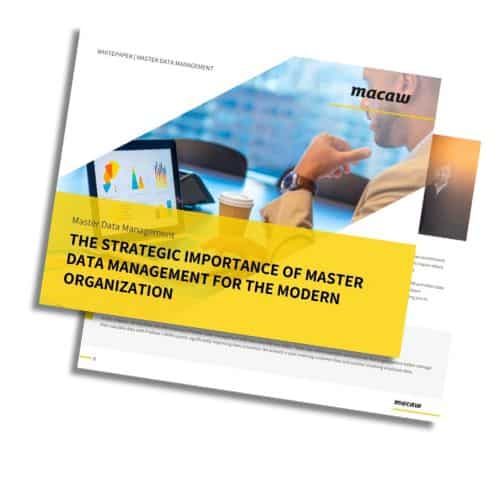Over the past years, organizations have invested significantly in developing robust data platforms. These platforms enable companies to cleverly collect, store, and process large volumes of data, allowing them to generate valuable insights for continuous growth. The next step is to truly operate in a data-driven manner. For this, data quality is of immeasurable value. Data becomes genuinely valuable when organizations steer based on reliable and accurate information. Poor data quality can lead to costly errors, inefficient processes, and misguided strategic choices. Therefore, it’s crucial for companies to ensure data integrity and optimize data sources.
Master Data Management (MDM) has become an indispensable tool for promoting data quality. With master data management, organizations create a ‘golden record’ – a reliable and consistent version of truth encompassing all data from various source systems. This enables the development of accurate and dependable datasets, forming the basis for well-informed strategic decision-making and streamlined business processes.
However, behind the technologies and processes lies a factor often overlooked: human behavior. Employee engagement and commitment play a pivotal role in the success of MDM initiatives. In this article, we delve into why factors like data ownership and sponsorship are essential in MDM, and how your organization can shape them.
Transitioning to a Data-Driven Culture
One of the biggest challenges in MDM implementation is managing change. Establishing new processes, introducing technologies, and redefining workflows can lead to resistance among employees. This is where change management becomes vital. It involves not only training employees to use new tools but also helping them understand the value MDM adds and how it can simplify their daily tasks.
Communication and Awareness
Effective communication is a cornerstone of every MDM strategy. Employees need to comprehend why MDM is being applied, the benefits it offers, and how it aligns with broader business objectives. Creating awareness helps reduce resistance and gets employees on board. Employees should not only know how to use MDM tools but also understand why they need to use them.
Collaboration and Data Ownership
MDM can only be successful as a collaborative effort within the organization. Different departments and teams often hold distinct perspectives on data and processes. Promoting collaboration and defining clear data ownership is vital. A well-defined owner ensures reliable information for decision-making and reporting, promotes data governance, and contributes to MDM’s success within the organization. This means responsibilities and authorities are clear to ensure data consistency and accuracy across the organization.
Continuous Training and Development
The technologies and best practices surrounding MDM are constantly evolving, consider the emergence of Fabric and OpenAI. It’s important to keep employees up-to-date and offer them training and development opportunities. This can range from workshops on new technologies to sharing case studies of successful MDM implementations. Employees who feel supported and see their employer investing in their growth are more likely to actively participate in MDM initiatives.
Rewarding Data Quality and Compliance
Another way to drive human behavior is by rewarding positive actions. In MDM, this involves acknowledging and rewarding employees who commit to accurate data entry, following processes, and maintaining high data quality. This can vary from recognition in team meetings to tangible rewards. Positive reinforcement can motivate employees to consistently contribute to the success of MDM.
Creating Support from the Top
Management must clearly understand the importance of data quality. Organizations should identify one or more sponsors within the organization who grasp the significance of data quality. These individuals not only hold leadership roles but also demonstrate involvement in problem-solving and pursuing improvements. Dedicated sponsors inspire others in the organization and place MDM on the management agenda.
Realizing the Full Potential of MDM
While the focus often rests on technologies and processes, it’s vital not to overlook the human factor. Human behavior, engagement, and commitment form the backbone of every MDM implementation. Support, ownership, change management, communication, collaboration, and continuous development are essential elements for creating and maintaining a data-driven culture. By embracing these aspects, organizations can realize the full potential of their MDM efforts and establish a solid foundation for long-term success.








